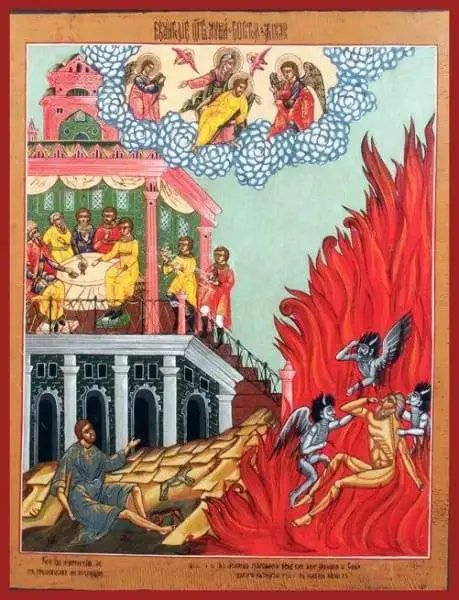Homily on Ephesians 4:1–6, Luke 18:18–27, and the Persecution of Christians
In the name of the Father, and of the Son, and of the Holy Spirit. Amen.
Beloved brothers and sisters in Christ,
Today’s Scripture readings speak deeply to the challenges faced by Christians in every age, but especially in times of persecution and trial. As we reflect on the Apostle Paul’s exhortation to walk “worthy of the vocation wherewith ye are called” (Eph. 4:1) and the rich ruler’s struggle to surrender his worldly attachments to follow Christ (Luke 18:22), our thoughts turn to the suffering Church in Syria and Ukraine and other regions where Christians endure persecution for their faith.
The Apostle Paul’s call to unity in Ephesians 4 is not merely an abstract ideal; it is a lifeline for the Church, especially in times of adversity. In Syria, the Christian communities Orthodox, Catholic, and others have faced unspeakable violence, displacement, and martyrdom. Yet, despite their suffering, they remain a testament to the unity of the Body of Christ.
St Ignatius of Antioch, himself a martyr of the early Church, wrote to the Ephesian Christians, “Where there is Christ Jesus, there is the Church.” In this, he reminds us that the Church is strongest when it is united in faith and love, even under the shadow of the cross.
This unity, however, demands great humility and sacrifice. St John Chrysostom exhorts us to bear with one another in love, saying, “Persecution does not destroy the Church; division does.” For us in the comfort of relative peace, we are called to solidarity with our suffering brethren, supporting them through prayer, advocacy, and material aid. Their perseverance is not only their witness but a challenge to us to live out our own faith with greater integrity and humility.
Turning to the Gospel reading, we hear of the rich ruler who asks, “Good Master, what shall I do to inherit eternal life?” (Luke 18:18). The Lord’s response is direct: Keep the commandments. Yet when the man insists that he has done so, Jesus challenges him further: “Sell all that thou hast, and distribute unto the poor, and thou shalt have treasure in heaven: and come, follow me” (Luke 18:22).
St Basil the Great speaks to this with great clarity: “The excess of wealth is a great burden, and it becomes an obstacle to the soul’s ascent to God.” This is not to say that wealth itself is evil, but that our attachment to it can hinder our communion with God. In today’s world, where materialism and consumerism dominate, this message is more relevant than ever. How often do we place our trust in possessions, careers, or status rather than in God? The Gospel challenges us to examine our hearts and ask: What is holding us back from truly following Christ? In a world that often prioritises material wealth and power, the faithfulness of suffering Christian communities in the West Asia is a rebuke to our complacency. We may not face the same life-and-death choices, but we are called to examine our own attachments whether to possessions, status, or ideologies and to ask what might be hindering our full surrender to Christ.
When the disciples hear Jesus say, “How hardly shall they that have riches enter into the kingdom of God” (Luke 18:24), they are astonished. “Who then can be saved?” they ask (Luke 18:26). Jesus’ response is full of hope: “The things which are impossible with men are possible with God” (Luke 18:27). St Augustine reflects on this, saying, “God’s grace does not destroy our free will but heals it, lifting us beyond our natural limitations to achieve what we could never do on our own.”
In our present age, the call to follow Christ often feels daunting in Western countries. We face challenges of moral compromise, societal pressure, and personal weakness. Yet the words of our Lord assure us that His grace is sufficient. If we place our trust in Him, He will enable us to overcome the obstacles that seem insurmountable. Again, the disciples’ question in the Gospel, “Who then can be saved?” (Luke 18:26), resonates deeply in the context of Syria’s ongoing tragedy. How can Christians remain steadfast amidst devastation? St Ephrem the Syrian, a great light of the Church from the very land of Syria, once wrote, “Do not despair, for Christ has made His Church unconquerable, and He Himself is her strength and shield.” This assurance reminds us that no power of this world can ultimately extinguish the light of Christ. Even in the darkest times, His grace sustains His people.
In both Syria and in the Ukraine, the Body of Christ bears wounds inflicted by violence, division, and oppression. Churches are destroyed, sacred icons desecrated, and faithful believers displaced or killed. In Ukraine, the canonical Russian Orthodox Church faces an additional dimension of suffering: not only external threats but also internal strife and attempts to divide the faithful. Churches are seized, clergy and laity are harassed, and ancient monasteries are desecrated. St John Chrysostom reminds us, “The devil has no greater joy than to see Christians divided, for in division, the strength of the Church is weakened.” Yet, even in these trials, the Church persists, united by the Holy Spirit, drawing strength from the Cross of Christ.
In Ukraine, the persecution of clergy and laity serve as a modern testimony to the cost of discipleship. These faithful Orthodox Christians, despite their suffering, cling to the truth of the Gospel. They show us what it means to “take up our cross daily and follow” Christ (Luke 9:23). St Basil the Great said that “The Church is a ship, and even if the whole world is shaken, it shall not sink, for Christ is at the helm.” Though their churches are destroyed, their faith remains unshaken, and their courage inspires us to examine our own priorities and attachments.
The destruction of churches in these countries is not merely the loss of buildings. These sacred spaces are places where heaven and earth meet, where the faithful have gathered for centuries to pray, to receive the sacraments, and to encounter the living God. When a church is desecrated or destroyed, it is an attack not only on bricks and mortar but on the soul of the Christian community. St Ephrem the Syrian says that “the Church is a haven of peace in a world of storm.” The destruction of churches seeks to extinguish this light of peace, yet the faithful know that Christ is present wherever His people gather, even in ruins or exile. In Ukraine, clergy and laity rebuild and worship in the face of constant threats. Their resilience reminds us of the early Christians, who worshipped in catacombs, knowing that “the things which are impossible with men are possible with God” (Luke 18:27).
Dear brothers and sisters, we cannot remain passive in the face of such suffering. St John of Kronstadt reminds us, “Every Christian is a soldier of Christ, called to defend the faith, not with weapons of violence, but with prayer, love, and truth.” We are called to stand in solidarity with our persecuted brethren, offering not only our prayers but also tangible support.
As Christians in lands of relative safety, we must not turn a blind eye to the suffering of our brethren. St Gregory Nazianzus teaches that “the pain of one member is the pain of all,” for we are all members of the Body of Christ. Their persecution is our persecution, and their steadfast faith is a call to deepen our own.
Practically, we must support the suffering Church through prayer, fasting, and tangible acts of charity. We must also speak out against the injustices they face, advocating for peace and the protection of religious freedom. And most importantly, we must let their example inspire us to live our own faith with greater courage and conviction.
Let us, therefore, my dear friends heed the words of Scripture and the wisdom of the Fathers. Let us walk in humility, bearing one another’s burdens and striving for unity. Let us walk worthy of our calling, standing in solidarity with our persecuted brethren, and striving for unity in the Spirit and the bond of peace. And let us remember that, though the challenges may seem insurmountable, with God all things are possible.
May the prayers of St Ephrem, St Ignatius, and all the holy martyrs strengthen us in faith, and may the grace of our Lord Jesus Christ be with us all. Amen.
Copyright © 2024 The Rev. Adrian Augustus



